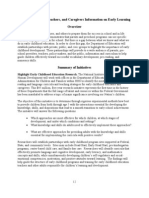Preschool Policy Facts
Preschool Policy Facts
Uploaded by
Maria Margaret MacasaetCopyright:
Available Formats
Preschool Policy Facts
Preschool Policy Facts
Uploaded by
Maria Margaret MacasaetOriginal Description:
Copyright
Available Formats
Share this document
Did you find this document useful?
Is this content inappropriate?
Copyright:
Available Formats
Preschool Policy Facts
Preschool Policy Facts
Uploaded by
Maria Margaret MacasaetCopyright:
Available Formats
Preschool Policy Facts
Promoting Childrens Social and Emotional Development Through High-Quality Preschool
by Judi Boyd, W. Steven Barnett, Deborah J. Leong, Elena Bodrova and Deanna Gomby
Knowing the ABCs does not by itself prepare children for school. Children need a combination of intellectual skills, motivational qualities and social-emotional skills if they are to learn once they enter kindergarten. Children must be excited and curious about learning and confident they can succeed (motivational qualities). They must be able to understand the feelings of others, control their own feelings and behaviors, and get along with their peers and teachers (social-emotional skills). Teachers rate these qualities as more important to school success than being able to hold a pencil or read. The growing number of children who are socially or emotionally unprepared for school means teachers spend too much time trying to rein in unmanageable children and too little time teaching. Many of these problems begin before kindergarten. If not addressed, they can result in behavioral problems that accompany children through their school years and into adulthood.
What We Know:
Teachers say about 20 percent of children entering kindergarten do not yet have the necessary social and emotional skills to be ready for school. In low-income families, as many as 30 percent of children may lack the necessary skills. Social and emotional development is important, both in its own right and because it facilitates cognitive development. Children with good social and emotional skills can get along with others, follow directions and pay attention. These are skills that will help them get the most out of classroom instruction. When children are young, the adults around them (parents and other adult caregivers, including preschool teachers) are the most important influences on their social and emotional development. High-quality preschool programs can create significant long-term social and emotional benefits. Much of the long-term economic payoff from public investments in highquality preschool programs will come through decreased crime and delinquency.
Policy Recommendations:
High-quality preschool education that is designed to enhance childrens social and emotional development can yield students who are more likely to graduate from high school, continue with higher education and avoid anti-social behaviors. As policymakers design preschool programs, they should: Include enhanced social and emotional development as a key goal. Design & implement standards specifying outcomes expected for social and emotional development. Expand access to high-quality preschool programs so more children can benefit. Ensure that all preschool programs are of high quality, since high-quality programs support social and emotional development. Provide administrators and teachers with technical assistance and training to help them implement effective curricula and teaching practices supporting social and emotional development.
NIEER
National Institute for Early Education Research
120 Albany Street, Suite 500 New Brunswick, NJ 08901 Tel (732) 932-4350 Fax (732) 932-4360
www.nieer.org
Preschool Policy Facts
Social-Emotional Benefits Preschool
How Social-Emotional Skills Develop Social-emotional skills develop in large part through childrens relationships with other people around them, including parents, caregivers and peers. Each play critical roles in the following ways: Parents and Families Parents and families play an enormous role in shaping a childs social and emotional development. Early relationships with parents lay the foundation on which social competency and peer relationships are built. Parental support greatly increases the likelihood that children will develop early emotional competence, will be better prepared to enter school and less likely to display behavior problems at home and at school. This is why many preschool programs include a focus on parental involvement and parenting education. Caregivers and Teachers Most children also spend many hours each week in the care of someone other than their parents. These caregivers play a similar role in promoting social and emotional development to that of parents when children are young. Just as parents who are warm and responsive are more likely to promote strong social and emotional skills in their children so too are early childhood educators and caregivers who provide this environment. The development of secure attachments between children and caregivers and teachers is important. That means staff turnover in preschool programs should be kept to a minimum. Peer Group Children Emotionally healthy children engage in positive play behaviors, develop mutual friendships and are more likely to find acceptance from their peers. Through their play, they learn how to work in teams and cooperate with others. As early as preschool, positive peer relationships can have a lasting impact on academic achievement and have been shown to contribute to more positive feelings about school and eagerness to engage in classroom activities. This in turn can lead to higher achievement. Conversely, early rejection by peers has been associated with persistent academic and social difficulties in elementary school. It is important for preschool teachers to encourage positive interactions and to intervene when children are having difficulties with peers.
Snapshot of Programs, Services and Benefits
Evidence that Preschool Influences Social and Emotional Development
There is convincing evidence that highquality preschool positively affects socialemotional development. Many studies of immediate and short-term outcomes show preschool to have meaningful impacts on self-esteem, motivation and social behavior. Longer-term studies demonstrate long-lasting benefits such as improved classroom behavior and social adjustment and decreased future crime and delinquency. These programs deliver high-quality center-based education services. Some focus on 3- and 4-year-olds; others provide services from birth to 5. Some offer parent education or family support services.
Program
High/Scope Perry Preschool Project 1962 - present
Services
High-quality preschool w/family intervention. 3- and 4-year-olds.
Benefit
Program group had higher achievement test scores, better attitudes toward school, higher high school graduation rates. As adults, program group earned more, owned homes more often, had lower crime rates. Intervention group had far lower rates of juvenile delinquency as teenagers. Program group children rated as more considerate, less hostile 5-8 years after services. Children who attended preschool more likely to express pride in their achievements and have better jobs. CPC children demonstrated greater cognitive achievement, better social adjustment, less-frequent grade retention, and lower rates of crime as adolescents. Cost-benefit analysis: substantial ROI in form of reduced crime rates and school remedial services and increased earnings capacity by age 21. EHS children had more positive interactions w/parents. Parents show more emotional support/less negativity. By age 3, children attentive to objects during play and reported by parents to be less aggressive. Preschool group showed lower scores on measures of mental health and antisocial behavior at age 17 and lower rates of criminal behavior at age 23. Higher rates of high school graduation and college attendance.
Syracuse University Family Development Research Program 1969 - 1975 Houston Parent Child Development Center 1970 Consortium for Longitudinal Studies Chicago Child-Parent Centers
Education, nutrition, health & safety, human service resources. Prenatal to 1st Grade. Home visits, family education, nursery school. Combined 11 studies of early childhood education programs begun in 1960s and 1970s. Preschool and Kindergarten w/family support services and continued intervention in early elementary school.
Early Head Start
Comprehensive educational, health and social services. Birth to age 3.
Mauritius
Two-year preschool. Ages 3 to 5. Three components: educational activities, nutrition, and physical exercise. Adult-child ratio 1:5.5. Full-day educational child care for low-income African-American children from birth to age 5.
The Abecedarian Project
Several studies the NICHD Study of Early Child Care, the Effective Provision of Preschool Education Project, and the Abecederian Project suggest that too much time spent in early childhood settings particularly low-quality ones may slightly increase childrens aggression levels. Yet, the bulk of the evidence is compellingly positive and derives from a broad range of investigation, beginning with demonstration programs implemented decades ago and continuing with present-day programs.
This fact sheet is based on the policy report Promoting Childrens Social and Emotional Development Through High-Quality Preschool by Judi Boyd, W. Steven Barnett, Deborah J. Leong, Elena Bodrova and Deanna Gomby. The report includes full references and is available at www.nieer.org in the NIEER publications policy report section. This was made possible by the generous support of The Pew Charitable Trusts. The opinions expressed are those of the authors and do not necessarily reflect the views of The Pew Charitable Trusts.
You might also like
- Headstart Logic Model 2Document4 pagesHeadstart Logic Model 2Kate And-Claudia100% (1)
- Parental Involvement - Final (Repaired)Document24 pagesParental Involvement - Final (Repaired)Jonel Mark Manlangit Rabe100% (2)
- Enriquez, Mary Grace M. - Summative AssessmentDocument10 pagesEnriquez, Mary Grace M. - Summative AssessmentMary Grace Manata EnriquezNo ratings yet
- Planning for Play, Observation, and Learning in Preschool and KindergartenFrom EverandPlanning for Play, Observation, and Learning in Preschool and KindergartenRating: 5 out of 5 stars5/5 (2)
- Unidad Didáctica 4º ESO HISTORY THROUGH CINEMADocument5 pagesUnidad Didáctica 4º ESO HISTORY THROUGH CINEMALeticia Alvarez de LunaNo ratings yet
- National Standards ParentDocument12 pagesNational Standards ParentManuela NeagoeNo ratings yet
- Parenting StylesDocument8 pagesParenting StylesmoonhchoiNo ratings yet
- Parental InvolvementDocument5 pagesParental InvolvementSteph Lugardo100% (1)
- Case Analysis: Nada Arif ECE 3703 Antoinette Wiseman September 20, 2018Document6 pagesCase Analysis: Nada Arif ECE 3703 Antoinette Wiseman September 20, 2018api-307403301No ratings yet
- Alangarno Complete ProjectDocument45 pagesAlangarno Complete Projectabdullahiyusufwuyo8No ratings yet
- Earlychildhood PDFDocument8 pagesEarlychildhood PDFkakayNo ratings yet
- Awareness and Participation of Parents Towards School Programs/Activities in Angadanan National High SchoolDocument60 pagesAwareness and Participation of Parents Towards School Programs/Activities in Angadanan National High SchoolRosalyn SyNo ratings yet
- Social-Contextual Determinants of ParentingDocument89 pagesSocial-Contextual Determinants of Parentingkikkuri13No ratings yet
- Parental InvolvementDocument7 pagesParental InvolvementOgunbodede AdebowaleNo ratings yet
- Description: Tags: LandryDocument5 pagesDescription: Tags: Landryanon-566318No ratings yet
- Aim: Welfare of Students: Our PerspectiveDocument2 pagesAim: Welfare of Students: Our PerspectiveSimran singhNo ratings yet
- In Learning: LessonsDocument8 pagesIn Learning: Lessonsapi-288462325No ratings yet
- Ece 497 WK 3 AsmtDocument12 pagesEce 497 WK 3 Asmtapi-255217309No ratings yet
- Final Parent Involvement Fact Sheet 14732 7Document4 pagesFinal Parent Involvement Fact Sheet 14732 7huwainaNo ratings yet
- Pree SchoolDocument12 pagesPree SchoolteodoraeneNo ratings yet
- Literature ReviewDocument9 pagesLiterature Reviewapi-403388857No ratings yet
- Edt 305 SDocument12 pagesEdt 305 SBenjamin GrayNo ratings yet
- PHD EM 312 - Quality Assurance in Education (Pt. 1) .EditedDocument4 pagesPHD EM 312 - Quality Assurance in Education (Pt. 1) .EditedChiara NicolleNo ratings yet
- Ece 497 WK 3 AssignmentDocument18 pagesEce 497 WK 3 Assignmentapi-289047606No ratings yet
- Article For Peer GroupDocument7 pagesArticle For Peer Groupapi-201770784No ratings yet
- Parental Involvement Study For Reference OnlyDocument47 pagesParental Involvement Study For Reference Onlyclarencesanders304No ratings yet
- Advocacy - Social Emotional DevDocument12 pagesAdvocacy - Social Emotional Devapi-349448402No ratings yet
- Pre K Research ReportDocument24 pagesPre K Research Reportapi-264041036No ratings yet
- Parenting Practices Across CulturesDocument18 pagesParenting Practices Across CulturesAmmara Haq100% (1)
- Parent Presenation - Ece 497Document14 pagesParent Presenation - Ece 497api-263079141No ratings yet
- Preschool ProgramsDocument30 pagesPreschool ProgramsSef Getizo CadoNo ratings yet
- Cultivate Relationships With Children, Family and The CommunityDocument7 pagesCultivate Relationships With Children, Family and The Communityapi-241706225No ratings yet
- Research On Parental InvolvementDocument9 pagesResearch On Parental InvolvementDainielle BianzonNo ratings yet
- Eng 105 Research PaperDocument22 pagesEng 105 Research PaperTanjina KabirNo ratings yet
- Ece 497 Week 3 Assignmt Parent PresentationDocument19 pagesEce 497 Week 3 Assignmt Parent Presentationapi-281034615No ratings yet
- Prachi seminar-III ReportDocument17 pagesPrachi seminar-III ReportPrachi AggarwalNo ratings yet
- Epp ImsDocument42 pagesEpp Imsqrhe30gswNo ratings yet
- Week3 AssignmentDocument13 pagesWeek3 Assignmentapi-268830339No ratings yet
- Course Code: 8610 Submitted By: Waqas Ali Roll No: BY672154 Semester: 3 Program: B.Ed (1.5 Years) Cell No: 0311-9441156Document9 pagesCourse Code: 8610 Submitted By: Waqas Ali Roll No: BY672154 Semester: 3 Program: B.Ed (1.5 Years) Cell No: 0311-9441156wikiNo ratings yet
- Parenting SkillsDocument97 pagesParenting SkillsSaqib BajwaNo ratings yet
- Strengthening Social-Emotional Learning of Students Under New Normal Education Brought by The PandemicDocument8 pagesStrengthening Social-Emotional Learning of Students Under New Normal Education Brought by The PandemicEulla May CorcegaNo ratings yet
- Research Chapter 1Document8 pagesResearch Chapter 1baldonado13aerolNo ratings yet
- Preschools Final DraftDocument8 pagesPreschools Final Draftapi-228795290No ratings yet
- The Impact of Parental Involvement On Students' Academic PerformanceDocument13 pagesThe Impact of Parental Involvement On Students' Academic PerformanceSteffi100% (1)
- Construction Module Project Write-UpDocument2 pagesConstruction Module Project Write-Upapi-514079890No ratings yet
- Mulenga CounsellingDocument8 pagesMulenga CounsellingKapela AjayNo ratings yet
- Proposal4 1Document9 pagesProposal4 1FrancisNo ratings yet
- Parent Survey QuestionDocument4 pagesParent Survey Questionhamletp12No ratings yet
- The Role of Parents in Sex Education: How Can Parents Be Better Equipped To Provide Accurate and Comprehensive Information To Their Children?Document7 pagesThe Role of Parents in Sex Education: How Can Parents Be Better Equipped To Provide Accurate and Comprehensive Information To Their Children?RaashiNo ratings yet
- Second VerDocument6 pagesSecond Verjiaqi3040No ratings yet
- Peer Relations: Table of ContentDocument54 pagesPeer Relations: Table of ContentZu Gayu 'sNo ratings yet
- Parenting Styles and Academic Performance of Senior High School StudentsDocument11 pagesParenting Styles and Academic Performance of Senior High School StudentsAJHSSR JournalNo ratings yet
- Importance of Early Childhood EducationDocument1 pageImportance of Early Childhood EducationDewanto Muhammad ZulqadriNo ratings yet
- Research Proposal Sample-Tammy Hardigree, Master StudentDocument16 pagesResearch Proposal Sample-Tammy Hardigree, Master StudentKairitu Ka MuraguriNo ratings yet
- Promoting Attitude To Help Other Through Mutual Cooperation Among 5th Class StudentsDocument22 pagesPromoting Attitude To Help Other Through Mutual Cooperation Among 5th Class StudentsAamir HabibNo ratings yet
- Presentation1 ParentDocument13 pagesPresentation1 Parentapi-289748229No ratings yet
- Parental Involvement On AcademicsDocument7 pagesParental Involvement On AcademicsAgatha GraceNo ratings yet
- Summary, Conclusion and RecommendationsDocument3 pagesSummary, Conclusion and RecommendationsAngela Murrielle GoNo ratings yet
- Sect7Document2 pagesSect7losangelesNo ratings yet
- Enriquez, Mary Grace M. - Summative AssessmentDocument10 pagesEnriquez, Mary Grace M. - Summative AssessmentMary Grace Manata EnriquezNo ratings yet
- Civil Procedure - Case DigestsDocument221 pagesCivil Procedure - Case DigestsMaria Margaret MacasaetNo ratings yet
- Efficient Use of Paper RuleDocument6 pagesEfficient Use of Paper RuleMaria Margaret Macasaet100% (1)
- Bondoc v. Judge SimbulanDocument4 pagesBondoc v. Judge SimbulanMaria Margaret MacasaetNo ratings yet
- Bondoc V SimbulanDocument14 pagesBondoc V SimbulanMaria Margaret MacasaetNo ratings yet
- CIR Vs ST Lukes (2017)Document13 pagesCIR Vs ST Lukes (2017)Maria Margaret MacasaetNo ratings yet
- NTC Vs AlphaomegaDocument11 pagesNTC Vs AlphaomegaMaria Margaret MacasaetNo ratings yet
- Certification/ Verification of PleadingsDocument3 pagesCertification/ Verification of PleadingsMaria Margaret MacasaetNo ratings yet
- Que V RevillaDocument3 pagesQue V RevillaMaria Margaret Macasaet100% (2)
- Estrada Vs Desierto: GR NO 146710 (353 SCRA 452)Document3 pagesEstrada Vs Desierto: GR NO 146710 (353 SCRA 452)Maria Margaret MacasaetNo ratings yet
- Legal Medicine ReviewerDocument12 pagesLegal Medicine ReviewerMaria Margaret MacasaetNo ratings yet
- Cyberbullying FactsDocument6 pagesCyberbullying FactsMaria Margaret MacasaetNo ratings yet
- Week2 Oral CommDocument15 pagesWeek2 Oral CommMaria Margaret MacasaetNo ratings yet
- Calalang V WilliamsDocument1 pageCalalang V WilliamsMaria Margaret MacasaetNo ratings yet
- Aberca v. VerDocument3 pagesAberca v. VerMaria Margaret MacasaetNo ratings yet
- IPL ReviewerDocument45 pagesIPL ReviewerMaria Margaret Macasaet100% (1)
- RP Vs LabradorDocument4 pagesRP Vs LabradorMaria Margaret MacasaetNo ratings yet
- Republic V LabradorDocument7 pagesRepublic V LabradorMaria Margaret MacasaetNo ratings yet
- Sistoza vs. DesiertoDocument2 pagesSistoza vs. DesiertoMaria Margaret Macasaet100% (1)
- Panch ShilDocument118 pagesPanch ShilSohel BangiNo ratings yet
- HRMT20024 Assessment 3 GuidelinesDocument3 pagesHRMT20024 Assessment 3 GuidelinesramanpreetNo ratings yet
- Active Learning Lesson PlanDocument4 pagesActive Learning Lesson Planapi-535388004No ratings yet
- TMNT SWDocument10 pagesTMNT SWLevi Hill100% (2)
- Doing My Homework Last MinuteDocument7 pagesDoing My Homework Last Minuteafnaborlnaaiea100% (1)
- Lec-02 - Asps of Soft SllsDocument15 pagesLec-02 - Asps of Soft SllsDhruvik sataniNo ratings yet
- Iste Certification - Alignment Map Lauren NesbittDocument13 pagesIste Certification - Alignment Map Lauren Nesbittapi-678665718No ratings yet
- Print Tier 4 (General) Student Visa - GOV - UK PDFDocument14 pagesPrint Tier 4 (General) Student Visa - GOV - UK PDFEmerson IpialesNo ratings yet
- Introduction To Program Hebat Bacaan Bi PDFDocument13 pagesIntroduction To Program Hebat Bacaan Bi PDFYanz Muhamad95% (21)
- CIPS ISP Education Plus Experience RouteDocument7 pagesCIPS ISP Education Plus Experience Routeraj28_999No ratings yet
- Practicum SummaryDocument5 pagesPracticum Summaryapi-745572658No ratings yet
- Little Millennium Proposal Presentation 2017Document43 pagesLittle Millennium Proposal Presentation 2017Surut Shah100% (1)
- KarthikDocument3 pagesKarthikKandasamy4467No ratings yet
- DLL - Mathematics 5 - Q3 - W9Document7 pagesDLL - Mathematics 5 - Q3 - W9arleen rodelasNo ratings yet
- Corporate Governance in Banking SectorDocument8 pagesCorporate Governance in Banking SectorDilshaad ShaikhNo ratings yet
- 3MS - Second Term Test - Bourouis by TeacherDocument5 pages3MS - Second Term Test - Bourouis by TeacherKaoutherNo ratings yet
- Pre Contract Cost Planning by Lahiru Dananjaya ADocument19 pagesPre Contract Cost Planning by Lahiru Dananjaya AKumari Wasala100% (1)
- Ethical Theories in Business PDFDocument2 pagesEthical Theories in Business PDFCynthiaNo ratings yet
- Python Programming & Data Science Lab ManualDocument25 pagesPython Programming & Data Science Lab ManualSYEDANo ratings yet
- Pettigrew WebsheetsDocument57 pagesPettigrew WebsheetsJuneNo ratings yet
- Firearm and Sword Possession Control LawDocument106 pagesFirearm and Sword Possession Control Lawduong0810No ratings yet
- Prospectus 01 PDFDocument44 pagesProspectus 01 PDFPragya BNo ratings yet
- NSTP PrelimDocument57 pagesNSTP PrelimCrystal AlcantaraNo ratings yet
- 1 - 1 - 1 - 1 - 2023-2024 Application FormDocument7 pages1 - 1 - 1 - 1 - 2023-2024 Application Formhtu.lumNo ratings yet
- Case Study of A Problem-Based Bridge Engineering Design CourseDocument6 pagesCase Study of A Problem-Based Bridge Engineering Design CourseJashwin UllalNo ratings yet
- The Wauseon Reporter - August 7th, 2013Document14 pagesThe Wauseon Reporter - August 7th, 2013thevillagereporterNo ratings yet
- Ra 9292 Sec.7 9Document14 pagesRa 9292 Sec.7 9Carmela Elaco VillanuevaNo ratings yet
- Ep 101 Seminar QuestionsDocument2 pagesEp 101 Seminar QuestionsamisamossiNo ratings yet
- Pcfta 3 Months Course - 2018 IntakeDocument48 pagesPcfta 3 Months Course - 2018 IntakeZieyda Suliman100% (1)











































































































